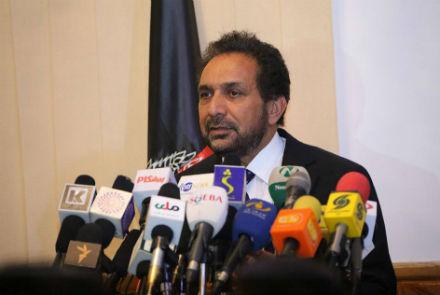Ahmad Zia Massoud, who was sacked from his position as the president’s special representative for reforms and good governance, on Tuesday said the move could pave the way for political instability in the country.
President Ashraf Ghani fired Massoud on Monday night, without giving any details.
However, soon after the announcement, Ghani’s spokesman Shahhussain Murtazawi said Massoud had been fired due to weak performance.
In reaction to his dismissal, Massoud said Ghani’s move will further add to the fragility of the political climate in the country and that the move could push Afghanistan towards a state of civil war.
“The president does not have the right to sack me from my post, because the government was formed on the basis of certain agreements; … if anyone takes such a move including the president or anyone else, such a move will pave the way for political instability and even for an escalating civil war,” said Massoud.
Massoud took an oath as Ghani’s top aide for reforms and good governance in October 2014 after the much contested elections, which led to the formation of the National Unity Government (NUG) under Ghani and CEO Abdullah Abdullah - the two frontrunners who bickered for months before forming the coalition government.
Commenting on the structure of the present political system, Massoud reminded the president that the NUG had been formed on the basis of documents, agreements and arrangements, adding that no group or individual was authorized to exploit other groups or individuals’ rights nor their political power.
He said that the president does not have the authority nor the right to sack him from his post.
Massoud argued that the unilateral decision by the president will push the country towards political turmoil and civil uncertainty, suggesting Ghani withdraw his decree issued on his dismissal.
In the first round of the 2014 presidential elections, Massoud ran as the first VP for presidential candidate Zalmai Rassoul, however in the second round of elections, Massoud came close to Ghani in the race but was later appointed as Ghani’s special representative for reforms and good governance.
Massoud, who also serves as deputy chairman of Jamiat-e-Islami party, under Salahuddin Rabbani, backed Ghani in the elections, a rare move that was met with mixed reactions among his supporters and party members.
“The consequences will not lead to a civil war, however this will lead to some dismay among a large number of people and the Afghan Mujahedeen about the order of the president; the next decision will be taken after necessary consultations,” said political commentator Jawed Kohistani.
Although the presidential palace initially refrained from commenting, a spokesman for the presidential palace said that the decision was taken on the back of few major steps being taken to improve good governance and reforms in the country.
“All appointments and dismissals are carried out in the government institutions on the basis of the constitution and the orders of the president. Every appointment or dismissal is aimed to improve the effectiveness of work in government institutions,” said presidential spokesman Shahhussain Murtazawi.
But, during the last election campaign, Ghani said on different occasions that Massoud’s post will be equivalent to the position of a vice president. Ghani even recommended that he would amend the constitution in order to designate Massoud as his third VP.
“With the coming of Mr. Massoud, our electoral team is now changed from a triangle to a square, we will work together with consensus along with our team members,” said Ghani during an election campaign appearance in Kabul in 2014.
“All work including the issue of reforms is supposed to be the responsibility of our office, but the president himself takes the duty for the reform process. Reforms in the legal institutions, security reforms, political reforms, economic reforms and all other work is tackled by the president himself. 45 commissions are run by the president, is it possible for a single person to take leadership of 45 commissions?” asked Massoud.
He added that no details were given about his dismissal and no consultations were made. He said even the CEO had not been consulted over the decision.
“The office of the chief executive officer of the Islamic Republic of Afghanistan was not consulted about the dismissal of his excellency Ahmad Zia Massoud, the CEO office was not informed, we believe that it is important to discuss such issues beforehand about high-level government officials who are part of the cabinet and the security council - in the view of situations that prevail in Afghanistan,” said the CEO’s spokesman Mujiburrahman Rahimi.
“He was serving in an important position; he needed to be cooperative with the president, vice presidents and the CEO and he should have worked to strengthen the system,” said former military officer Mohsin Mukhtar.
“Unfortunately the government is suffering from internal disputes and it is a very concerning issue,” said senator Mohammad Alam Izidyar.
Massoud suggested Ghani overturns his decree in order to avoid pushing the country towards political instability and civil war.


